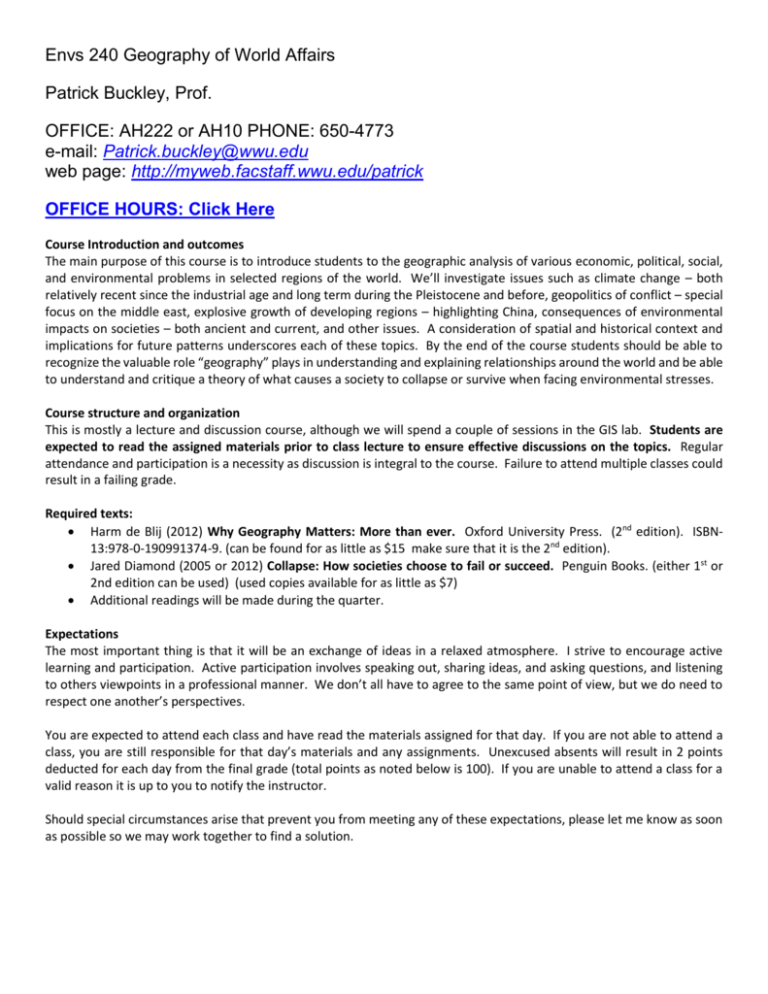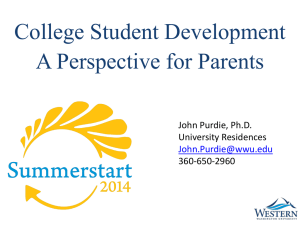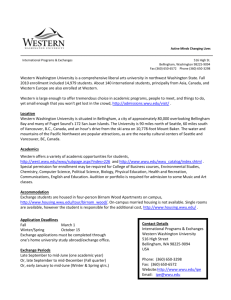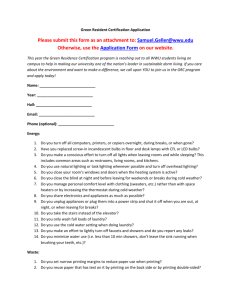Syllabus & Schedule
advertisement

Envs 240 Geography of World Affairs Patrick Buckley, Prof. OFFICE: AH222 or AH10 PHONE: 650-4773 e-mail: Patrick.buckley@wwu.edu web page: http://myweb.facstaff.wwu.edu/patrick OFFICE HOURS: Click Here Course Introduction and outcomes The main purpose of this course is to introduce students to the geographic analysis of various economic, political, social, and environmental problems in selected regions of the world. We’ll investigate issues such as climate change – both relatively recent since the industrial age and long term during the Pleistocene and before, geopolitics of conflict – special focus on the middle east, explosive growth of developing regions – highlighting China, consequences of environmental impacts on societies – both ancient and current, and other issues. A consideration of spatial and historical context and implications for future patterns underscores each of these topics. By the end of the course students should be able to recognize the valuable role “geography” plays in understanding and explaining relationships around the world and be able to understand and critique a theory of what causes a society to collapse or survive when facing environmental stresses. Course structure and organization This is mostly a lecture and discussion course, although we will spend a couple of sessions in the GIS lab. Students are expected to read the assigned materials prior to class lecture to ensure effective discussions on the topics. Regular attendance and participation is a necessity as discussion is integral to the course. Failure to attend multiple classes could result in a failing grade. Required texts: Harm de Blij (2012) Why Geography Matters: More than ever. Oxford University Press. (2nd edition). ISBN13:978-0-190991374-9. (can be found for as little as $15 make sure that it is the 2nd edition). Jared Diamond (2005 or 2012) Collapse: How societies choose to fail or succeed. Penguin Books. (either 1st or 2nd edition can be used) (used copies available for as little as $7) Additional readings will be made during the quarter. Expectations The most important thing is that it will be an exchange of ideas in a relaxed atmosphere. I strive to encourage active learning and participation. Active participation involves speaking out, sharing ideas, and asking questions, and listening to others viewpoints in a professional manner. We don’t all have to agree to the same point of view, but we do need to respect one another’s perspectives. You are expected to attend each class and have read the materials assigned for that day. If you are not able to attend a class, you are still responsible for that day’s materials and any assignments. Unexcused absents will result in 2 points deducted for each day from the final grade (total points as noted below is 100). If you are unable to attend a class for a valid reason it is up to you to notify the instructor. Should special circumstances arise that prevent you from meeting any of these expectations, please let me know as soon as possible so we may work together to find a solution. Grade Points Participation Exercises Mid Term Final 20 20 30 30 pts Total 100pts. Unexcused absence -2 per class Exams The midterm and final will cover concepts and terminology from the readings, lectures, and other materials presented and discussed in class including maps and diagrams. Questions will be in the form of short answers\essays and possible multiple choice of fill-ins. EXERCISES & PARTICIPATION In-class exercises are intended to provide you an opportunity to offer your perspectives on the topics. The exercises will include questions about the theme of the reading(s), key questions they answer, whether or not the conclusions are logically sound, and if you agree or disagree with that the authors were saying? You also will be asked to provide examples from the reading(s). Exercises must be completed in-class and turned-in on the same day to receive credit. Participation is important for the following reasons: First, it helps you to synthesize and engage more actively with the course material. Second, public speaking skills are becoming more important in all careers, and participation gives you a chance to develop communication and speaking skills. Third, the students in this class have diverse backgrounds and experiences thus sharing individual perspectives and insights will help us all learn more and appreciate different angles. Your collective knowledge is far superior to my individual knowledge! COURSE POLICIES Please be considerate of your classmates – no talking, no web surfing, no texting, and turn-off cell phones during class time. Seriously!! I suggest you make friends with a classmate so that in the unlikely event of your absence, you will have a source for class notes. You are responsible for obtaining all assignments. With proper documentation, I am sympathetic to illnesses, family emergencies, and other conflicts that may force you to miss class. Proper documentation includes: note from a doctor, note from Student Health Services, or other valid notice. If in doubt, please ask me. In general, no make-up exams will be given. Contact me beforehand in the event you find you are unable to take an exam at the scheduled time due to some personal emergency. According to University policy, no early exams may be given. “Mutual respect for everyone is key to ensuring a safe environment that promotes learning for all students.” Please notify the instructor and/or Equal Opportunity office if issues arise. Student services, if anyone is in need of university services for students here are the offices to contact: Research-Writing Studio, Student Health, Counseling Center, Dean of Students, University Police Academic Honesty & Integrity: All university policies concerning honesty and plagiarism will be enforced in the course. You may review plagiarism at the following WWU site http://www.libguides.wwu.edu/plagiarism and academic honesty at http://catalog.wwu.edu/content.php?catoid=5&navoid=463 . see also http://www.wwu.edu/integrity/ "For help and guidance with the academic honesty procedures, students should contact the Student Life Office." http://www.wwu.edu/dos/stulife/ Cheating of any kind will not be tolerated. I will use all of my abilities to have cheaters expelled from class according to established University guidelines. Reasonable Accommodation Please see me if you have disability or accommodation issues and we will work together to find a solution that best meets your specific needs .Federal and state guidelines guarantee the right of students to “reasonable accommodation” for documented disabilities. Reasonable accommodation for persons with documented disabilities should be established within the first week of class and arranged through Disability Resources for Students: telephone 650-3083; email drs@wwu.edu; and on the web at Disability Resources http://www.wwu.edu/depts/drs/ This syllabus is subject to change. Changes, if any, will be announced in class. Students will be held responsible for all changes DRAFT OF SCHEDULE EXPECT CHANGES updated on Nov. 4, 2015 Updated Nov. 4, 2015 Week Day Date Chapter 1 1 28 2 30 Chap 1 2 3 5 4 4 7 5 3 5 12 6 6 14 4 7 19 7 8 21 5 9 26 10 28 Test 1 6 11 2 prologue 12 4 " 7 13 9 2 8 9 10 14 15 16 17 18 19 20 11 16 18 23 25 30 2 Topic Introduction Why Geography Matters Geography and Climate Change Climate Place and Fate The Geography behind war and terror Lab Day -- exploring Vietnam, Iraq, and Afghanistan Interpreting terror's geographic manifestations Reading Critical thinking and review of chapter main points and hypotheses Lab Day -- Easter Island & Viking Greenland -- Prologue Diamond's Collapse Discussion of Five-point Framework Ch. 2: Twighligh at Easter & Collapse video (all parts) https://www.youtube.com/watch?v=gdBSWjxKJOE 7&8 " 9 Vikings: Ch. 7 & 8 (Diamond) Vikings cont. Opposite Paths to Success (Diamond) 14 Ch 8 Why do some societies make disastrous choices (Diamond) China (De Blij Ch 8) and video BBC Documentary 2015 ||China- The New Superpower https://www.youtube.com/watch?v=emDz5qghrzY Final See WWU Timetable https://admin.wwu.edu/pls/wwis/wwskcfnd.TimeTable Geography Program Student Learning Objectives: By the end of the class will be able to: GEOG 1: Demonstrate literacy around the concepts of space, place, landscape, and location; As an introductory level class with a strong regional and applied bent, students will be able to define and illustrate these concepts based on materials discussed in the class. GEOG 2: Demonstrate an understanding of and appreciation for the diversity of national and global cultures; Since a major focus of this class is studying a number of regions on the face of the earth this is integral to the class and students will be quite well versed on the regions that we explore. GUR This course is a part of the General University Requirements (GUR) program under the Social Science Category (SSC). Students in this course will make some progress towards gaining the following GUR proficiencies, with emphasis on the ones in bold: - Analyze and communicate ideas effectively in oral, written, and visual forms - Analyze and interpret information from varied sources, including print and visual media - Identify and analyze complex problems - Recognize the rights, responsibilities, and privileges of participating in, and contributing as a citizen in, a diverse society - Understand and evaluate assumptions, values, and beliefs in context of diverse local, national, and global communities - Understand and assess the impacts of interactions among the individual, society, and the environment





